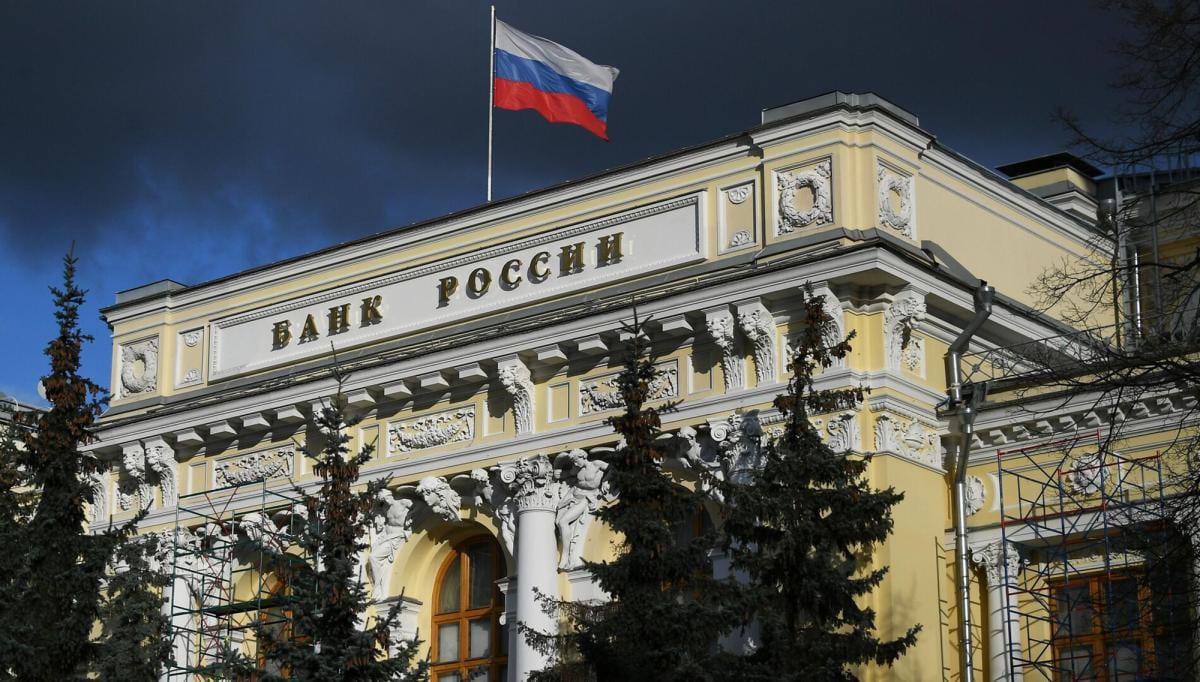The West is battling inflationary pressures stimulated by monetary policy during the worst of Covid and compounded by higher energy prices since the start of Russia's invasion of Ukraine. Inflation is arguably President Joe Biden's biggest headache. In contrast to the West, prices are going down, to the delight of Russian officialdom and the ruble is the best performing currency of late. But there can be too much of a good thing and Russia may have to cope with deflation. Mikhail Sergeyev, who heads Nezavisimaya Gazeta's economic department reports that Russia may be facing a major recession reminiscent of America's Great Depression and Japan's decade of stagnation. Deflation could result in layoffs and unemployment as consumer demand and investments contract. Furthermore, Russia's emergence from a deflationary tailspin could drag on due to the uncertainty factor prompted by the sanctions on Russia.
Sergeyev's article follows below:[1]

Russia's Central Bank, The Bank of Russia (Source: Ria.ru)
"The Russian economy is on the verge of stalling into a deflationary tailspin. The decline in retail and wholesale prices is already encouraging the postponement of purchases and investments. After all, what is the point of buying metal, apartments, planks, or other construction materials today if their prices are literally depreciating every month? As the history of the Great Depression in the US, or the example of the multi-year stagnation in Japan have demonstrated, it takes more than a decade to get out of the deflationary spiral
"Actually, today’s Russian crisis is also exacerbated by the uncertainty factor, which prevents forecasting the start of economic recovery. Such uncertainty can postpone for years the beginning of a recovery in demand, or investment.
"The current management of the Bank of Russia has learned from American textbooks, which begin with a description of the dangers of deflation. Thus, say the experts, one can expect a rapid response from [Bank Chair] Elvira Nabiullina’s institution, taking the form of another [interest] rate cut and the weakening of the ruble. However, these expectations by themselves, are also prompting actors to postpone investment, i.e. they serve as a factor in a new deflationary wave.
"For three weeks (from May 28 to mid-June) an absolute decrease in retail prices was recorded in Russia, which reached more than a quarter of percent. At the end of summer, Russia usually experiences one month of deflation against the backdrop of seasonal price cuts and the arrival of a new harvest. But the current situation is fundamentally different. Today’s deflation is caused by the factor of physical overproduction of many resources in the conditions of export sanctions limitations [imposed on Russia], as well as the contraction of consumer demand.
"These out-of-season factors are listed in a new study published by the Center for Macroeconomic Analysis and Short-Term Forecasting (CMASTF). Essentially, Russian steel works have already announced a probable reduction in production by more than a quarter due to sanctions and shrinking domestic demand. The situation in the wood processing industry is similar: overproduction in this sphere may exceed 30%.
"Experts call the current drop in prices on construction materials strikingly pronounced. Particleboards have fallen in price by an average of 5.5% in three weeks, while planks - by 2.5%. Economists ascribe such a price decrease to the start of a drop in consumer demand, especially in relation to 'investment' goods. In turn, woodworking companies also point to the strong influence of the anti-Russian sanctions, which determined excess production (excessive, in comparison to the demand of the [sanctions] 'strangled' domestic market).
"There are noticeable expectations of price decreases in the housing market as well. According to the latest consumer sentiment survey conducted by 'IRN.RU,' an overwhelming majority of survey participants (68.5%) expect a decline in real estate prices over the next three months. In comparison with the spring survey, the proportion of such expectations increased by 10.7 %. About a third of the respondents – 29.7% – believe that prices will drop by up to 5% over the summer, while 38.8% expect to see a more tangible decrease.
"The share of those who expect a nominal increase in the square meter price of a real estate, compared with that in March decreased from 27.7 to 16.2%. About 15% of the June survey participants believe that prices won’t change over the summer, the number of such replies almost equals that in March (14.5%).
"Apartment prices in the country’s capital have already started to decline. According to the analytical center 'IRN.RU,' in May the housing market in Moscow experienced tangible decline for the first time since the beginning of 2018, went into minus – during the month prices at the secondary housing market fell by 0.6%. In New Moscow and Moscow Oblast, which are centers of the cheapest housing in the region, there is no significant price drop yet, however, the rise in prices has almost stopped completely.
"'The price decline that began in May is likely to continue, as under the current ruble exchange rate and the decreasing incomes of the population, today’s [housing] prices look completely inappropriate. The cost of housing should fall back at least to the levels of early 2022, that is, it should drop by the 5-10%, the amount by which the price had increased in the spring during the weak ruble,' said the Head of the Real Estate Market Indicators IRN.RU' analytical center, Oleg Repchenko."

Oleg Repchenko (Source: Rosbalt.ru)
"The food goods complement a picture of a growing deflationary front. 'The prices of several types of meat and meat products started to fall, [primarily it concerns] pork (-1.1% over three weeks) and chicken (-0.69%), as well as cooked sausage (-0.27%).
"This effect is probably attributed to oversupply. According to the CMASTF experts, the option of exporting pork under the conditions of settlement issues is limited, and the demand of low-income population groups for cheap types of meat is at least not growing. According to their data a drop in prices for petroleum products was registered too: gasoline and diesel fuel cheapened by 0.1% over the past three weeks.
"This is connected with the appearance of a market supply surplus market (due to export restrictions and the technical impossibility of quickly decreasing oil production) against a backdrop of limited demand, in the experts' evaluation. In retail, the prices of a number of mass-market drugs also continue to drop.
"However, domestic prices for a number of goods continue to grow markedly. In Russia, for instance, there is a slow but steady rise in prices of goods produced of grain. For three weeks the rise in prices for wheat bread reached 0.5%, cookies - 0,42%, rye bread - 0,36%, wheat flour - 0,28%. CMASTF Economists attribute this effect to inflationary impulse from the world grain market entering the Russian economy (despite a quite powerful, tiered system of protection against imported inflation created over the last two or three years).
"'Sustained deflation is a most menacing factor. It accompanied the US economy during the Great Depression and had a long-lasting effect in Japan during the decade of stagnation and the 'Japanese disease,' recalled Deputy Director of the Development Center at the Higher School of Economics, Valery Mironov. Meanwhile, the way out of the deflationary spiral, under the current Russian conditions, is complicated by the uncertainty factor. 'In the case of a recession that occurs without the uncertainty factor, economic actors have an approximate understanding, when the recovery phase will begin. But in the case of our crisis there is no such understanding. Thus, the way out from the recession can drag on for years, due to postponed investments, or reduced production,' explained the economist. According to him, price signals are very important for the movement of capital. And the latter is unlikely to be attracted to sectors, where a decline in prices is observed."

Valery Mironov (Source: Publico.ru)
"According to data of Rosstat [Federal Service for State Statistics], May wholesale prices in the sphere of mineral extraction reached only 78.3% of those in April. While manufacturing industries in May demonstrated average prices that totaled 98.3% of the April indicators.
"In the coal mining industry, wholesale prices in May fell by almost 5% as compared to those in April; in oil and gas production, the decline in wholesale prices amounted to 27.5%, and in the production of metal ores - 14%. In metallurgy production the decrease of wholesale prices in May was about 4.2% in comparison to April.
"Accustomed to fight inflation, Russian officials perceive the current decline in prices as a benefit and even a source of pride, perhaps, not realizing all the dangers of deflation.
"But Mironov hopes that Russia’s Central Bank specialists can recognize these risks in time. 'There are good macroeconomists, with a Western education, among the Central Bank's top management. Western textbooks on macroeconomics start with the dangers of the deflationary spiral that occurred during the Great Depression. Therefore, there should be no procrastinated reaction on part of the Central Bank,' said Mironov. In his opinion, a drastic reduction in the key interest rate, could push money out of bank deposits and weaken the ruble, which would also have a positive impact on price signals within the economy.
"However, the latest Central Bank report on the state of industry draws a generally positive picture. 'The Bank of Russia’s business climate indicator rose in May due to both an improvement in companies’ expectations and a decrease in negative assessments of the current situation. Companies’ expectations of production and demand have improved, but at a slower pace than in the previous two months. Price expectations continued to decline, returning to February 2021 levels,' reads the Central Bank document titled 'Enterprise Monitoring' published in June of 2022."
[1] Ng.ru, June 26, 2022.




